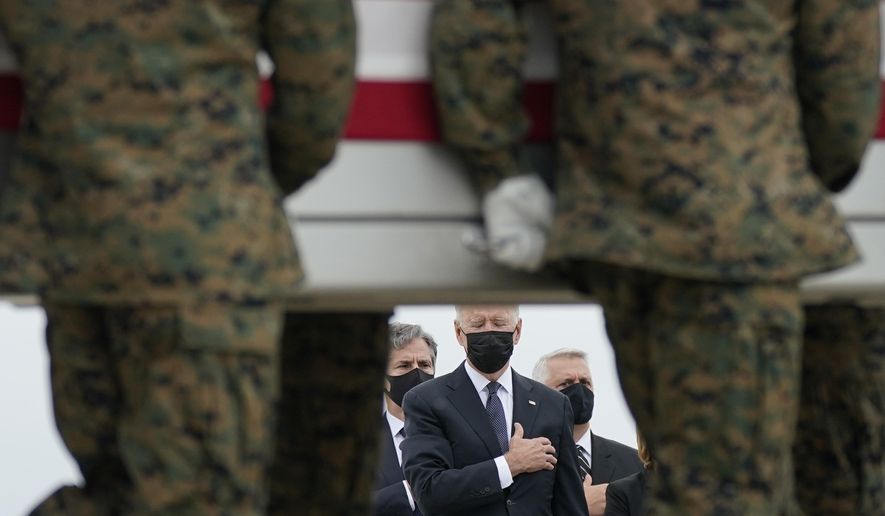OPINION:
Editor’s note: This is one in a series examining the Constitution and Federalist Papers in today’s America.
The framers of the Constitution would not have been surprised by the recent failure in Afghanistan. Nor would they have been surprised by the failure in Vietnam two generations ago.
Victors in their own war against the most impressive military on the planet at the time, they understood that a nation and its citizens can only win wars to which they formally commit. That’s why they intentionally and explicitly separated the powers necessary to wage and win wars between Congress and the president. By doing so, they created a system that requires broad national agreement prior to committing the nation to war.
The Framers believed that engaging in war and committing the nation to war is a step that requires consideration and deliberation of the merits and possible tradeoffs by the people’s representatives. If the national interest is served by resorting to war, national resolve would be made plain and strengthened by the ratification of the citizens’ representatives.
In Article I, the Framers gave Congress explicit and enumerated authority: “To declare war, grant letters of marque and reprisal, and make rules concerning captures on land and water; To raise and support armies … To provide and maintain a navy; To make rules for the government and regulation of the land and naval forces …”
At the same time, they knew that councils of wars are breeding grounds of timidity. Giving the nation the best possible chance of winning wars required placing the execution of war in the hands of the president.
In Article II, the Framers made it clear that: “The President shall be Commander in Chief of the Army and Navy of the United States … “
Alexander Hamilton was similarly clear about the limits the Framers intended with respect to the president in the 69th essay of The Federalist Papers: “The President is to be commander-in-chief of the army and navy of the United States. In this respect his authority would be nominally the same with that of the king of Great Britain, but in substance much inferior to it. It would amount to nothing more than the supreme command and direction of the military and naval forces, as first general and admiral of the Confederacy; while that of the British king extends to the declaring of war and to the raising and regulating of fleets and armies-all which, by the Constitution under consideration, would appertain to the legislature.”
They also understood that war is, for the most part, the enemy of liberty and restrained government. James Madison came right to his point: “Of all the enemies to public liberty, war is, perhaps, the most to be dreaded because it comprises and develops the germ of every other.”
Having just concluded a desperate and terrible war in which one was used against them, they had a justified fear of the dangers of a standing army. Standing armies promote military adventurism and enable and encourage one man to commit nations to conflict.
Unfortunately, too many members of Congress have forgotten their history. Too often with respect to war, they have been willing to be partisan accomplices of a president of their party rather than guardians of the authorities of Congress and tribunes of the people. Members of both parties are guilty. Across the three generations that now separate us from victory in World War II, Republican and Democratic presidents and Congresses have launched us into wars without the benefit of the clarity and resolve of purpose required for a declaration of war.
The Gulf of Tonkin resolution (Vietnam) and the Authorization for the Use of Military Force (Afghanistan, Iraq and pretty much anywhere else a president feels like chasing villains) are poor substitutes for declarations of war and poor explanations of why Americans should send their children off to war.
When one man can send an entire nation to war for reasons and with goals that are, at best, unclear, it is a recipe for disaster. Because declarations of war in Vietnam and Afghanistan were never debated by or approved by Congress, the nation was never fully committed to victory in either instance.
No one in the active military, in Congress or the presidency has ever been willing or able to articulate a vision of what victory might have looked like in either Vietnam or Afghanistan. Because Congress never did what it was supposed to do, we never had a clear goal in either Vietnam or Afghanistan.
Things as nebulous as a war on terror or a war of containment are bound to fail. By necessity, wars need to be about achieving a specific goal, and that something needs to be agreed upon by the citizenry. That’s why declarations of war are essential to the enterprise.
There also needs to be clarity about how many people we are willing to kill to achieve our goals. In World War II, that answer was obvious: everyone on the other side. In every subsequent conflict, the answer has been unclear. Consequently, we wind up in “managed” conflicts that serve no material policy or moral purpose.
It is no accident that World War II was both the last war won by the United States and the last war declared by the United States. Undeclared wars — like Vietnam or Afghanistan — can’t be won. The Framers understood this. We should, too.
• Michael McKenna served in the Reagan, Bush and Trump administrations.





Please read our comment policy before commenting.